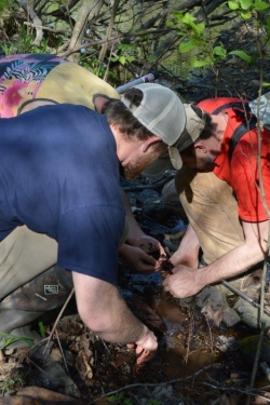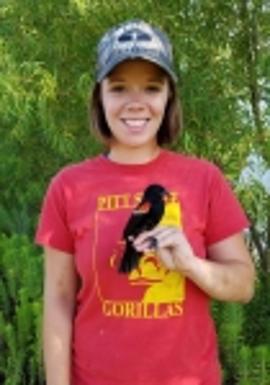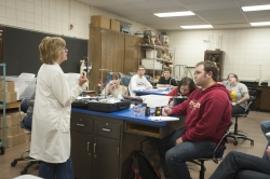Why Choose Biology at Pittsburg State University?
 The Department of Biology meets instructional needs for students:
The Department of Biology meets instructional needs for students:
- on a variety of career tracks within biology
- as support for other disciplines
- as a basic body of shared knowledge for general education
We have undergraduate programs covering the range of modern biology including pre-health (pre-med, pre-dentistry, pre-physician assistant, pre-vet, pre-optometry), pre-physical therapy, medical laboratory services, cell and molecular biology, field biology and environment, ecology, and secondary education.
There are over 400 students in the undergraduate program and about 20 in the graduate (masters) division. The Department of Biology has 13 full-time faculty with a wide range of interests. The faculty are dedicated and committed to the university and the department, but most importantly, to the students. Most faculty are actively engaged in research activities, national professional organizations, and professional service.
The practice and instruction of biology depends on equipment, supplies, and facilities. Although there is much to be learned by reading, biology must be expressed as a "hands-on" science. The Department of Biology's physical facilities and equipment provide opportunities for both field biology and laboratory/health science teaching and research. Today, both undergraduate and graduate students use these facilities and equipment as a part of classroom instruction or research.
The Department of Biology is located in Heckert-Wells Hall just across Joplin Street from the stadium and on the east side of the oval. Locate Heckert-Wells Hall using Google Maps or the PSU Map (PDF). The department has provided quality education in the life sciences for southeast Kansas and the surrounding region since 1909. Read about the history of the department.
The Department of Biology occupies the top two floors, including a roof-top greenhouse. The building contains faculty offices, the departmental office, and numerous teaching and research labs. Classrooms in surrounding buildings are used for lectures as well as some of our lab rooms.
- High School Student Preparation
- Careers in Biology
- Student Life
- Transfer Students
Students often ask about what they should do in high school to be prepared to enter college as a biology major. It is important to realize the biology major is a challenging curriculum with required chemistry and math and physics required or recommended in some areas.
Success in university courses is actually less dependent on having had specific high school courses and more dependent on their content and rigor. Successful students bring some facts and general knowledge with them, but more than anything else they bring a studious attitude, study skills, and good work ethic. Surprisingly, high school biology, taken by itself, is a poor predictor of success in college biology. An easy time in high school can leave a student underprepared for the college biology major. If you were not made to work hard in high school, you will have to make a transition to the college biology major.
Coursework
- Take challenging high school coursework in and out of the sciences.
- You need chemistry and physics - they provide a solid foundation in the physical sciences for biological study at the university. In general, students with good chemistry and physics backgrounds from high school have a better chance of succeeding in biology.
- Additional biology or science classes, such as anatomy and physiology, genetics, or advanced science are often taken in high school. These are beneficial classes, but do not neglect solid chemistry and physics classes! Take biology as a sophomore, chemistry as a junior, and physics as a senior. Then while a junior and senior take additional science courses if they are available. Tackle a challenging Science Fair project too!
- Math courses are also important. Algebra I, algebra II, and trigonometry are common high school math courses you should have. If you have the chance, take calculus, or wait for a university class. Math is important because it is a "way of thinking", as much as anything else, and helps prepare your mind for chemistry and biology.
- Take a computer course that allows you to develop real skills using spreadsheets, word processors, and databases.
- English, literature, history, and speech? Yes! You will become a biologist, but biologists read, write, and speak - a lot. Reading is so fundamental to success that student test scores on reading are often better predictors of success in science than a science background. If you read well or like to read and are curious about the world, you have the basic skills to succeed at the university.
- See your guidance counselor for information about the Regents Qualified Admissions and other requirements for acceptance into PSU and other Kansas Board of Regents institutions.
Attitude and Aptitude
A good attitude is important, but a good attitude comes from working hard. Satisfaction comes from achieving goals you had to work for. A good attitude is a mature view of learning - a desire to learn everything you can and not let minor complaints about the courseload, the tests, the book, or the instructor get in the way of your achievement. And what about aptitude? You don't have to be a "rocket scientist" to be a decent biologist. While high scholastic achievement certainly puts you in the competition for some very competitive medical fields requiring post-graduate study, in most other areas a solid GPA and good technical skills will do.
Will I succeed?
Many students like biology and are drawn to it because of life experiences - love of animals, an encouraging high school teacher, a family relative or friend that is a health professional, or the love of the outdoors. While these experiences are a start, they must be accompanied by the ability to do well in university coursework.
Overall, the biology major is a very demanding curriculum. In the medical areas, even very qualified students do not always get into the professional school of their choice - the competition is great. Medical schools and physical therapy programs are full, and many more students apply than get in. Consider alternative careers in health, some that may be achieved at community colleges. Visit our Areas of Study website for information about the various areas of biology. See your high school teacher or counselor, and be realistic when you evaluate your skills and interests.
How to apply! Want to visit?
Contact the Pittsburg State University Office of Admission for all the details. Want to visit? We'll be happy to see you.
What does a biology major do?
Your interest in biology and life sciences can come from several directions.
- Perhaps your primary interest is in one or more of the many human health career areas like medicine, medical technology, veterinary medicine, physical therapy, or any of the new assistant health careers in dentistry, medicine, or physical therapy.
- On the other hand, you may be an outdoor person, interested in jobs involving animals, plants, ecology, fish or wildlife management, natural history, pollution, or environmental science.
- You might also be fascinated by a teaching career or biological research in areas such as health, genetics, or ecology.
- Maybe you're not sure but just know that biology is an area you are very interested in.
Don't forget to check PSU's Office of Career Development for related information. Stop by the Career Services office in the H.W. Smith Student Success Center (Axe Library) for assistance.
General Information about Biology Careers
- Careers in science and engineering (The National Academies of Science, Engineering & Medicine)
- Careers for biology majors from Furman University's Department of Biology
- AIBS Biology Careers in the Biological Sciences
- Career explorations for biology majors - follow link to careers and bio/med/environment
Health and Laboratory Sciences - Online Career Information
Many students are interested in health careers. From being a doctor to a physical therapist to a medical laboratory worker, the career opportunities are many and varied.
The links provided serve as a good introduction to the range of health career opportunities possible and the types of training needed. Also, try the major search engines for more information.
To help your search, think of health career opportunities in terms of primary care by the medical doctor with support from allied health professions, including professional health providers such as physical therapists and medical and laboratory support professional staff such as dental hygienists, phlebotomists, and respiratory therapists. The distinctions are based on educational and professional requirements.
Many of these allied health careers do not need four years of college, and training is available at two-year or four-year institutions.
- Public Health Online provides public health resources, materials and tools to those considering a career in public health or currently employed in the industry.
- You'll find descriptions of 18 allied health professions from the Commission on Accreditation of Allied Health Education Programs.
- Information on many lab-related careers can be found at the American Society of Microbiology.
- Information on the allied health occupations and educational programs from the Career Library of the University Health Services at UC-Berkeley.
- The PSU Biology Health Professions Handbook contains information for the student who has already decided on a program, and it also provides links to many of the professional and college associations.
Field Biology, Environment, and Conservation
General Environmental Job Links:
- Environmental Careers (Green Careers Journal)
- Good Works
- Biology, Conservation, and Oceanography
- EnvironmentalJobs.com
Summer Jobs/Volunteer Work/Internships:
Marine and Animal Sciences:
General Online Job Information
Who are biology majors?

There are over 400 students in the undergraduate program and about 20 in the graduate (masters) division. While most are traditional students (recent high school graduates), non-traditional students are well represented.
Biology majors come from all parts of Kansas, the greater four-states area (especially Missouri and Oklahoma), and around the world. Many students reside in residence halls, while some live in town or commute.
You will find biology majors as student leaders in residence halls, student government, and as student ambassadors.
What do students do besides study?
As is the trend everywhere, most students work more hours now than students 10-20 years ago. This places an additional burden on students, with less time for study but still a desire to graduate on time.
Southeast Kansas has many recreational opportunities for swimming, fishing, hiking, and camping. The southeast Kansas strip pits (lakes formed from pits left from mining days) are great for fishing and the land around them for hunting. We're close to great Kansas lakes and state parks (Lake Crawford, Elk City Lake, Fall River Lake) and not all that far from great outdoor opportunities from the Ozarks of Missouri and Arkansas. In the summer, the city of Pittsburg opens a large Aquatic Center.
Culture comes to southeast Kansas and southwest Missouri too. Music and theater programs are scheduled throughout the year. PSU sponsors the Performing Arts and Lecture Series each year. There is also the Pittsburg Community Theatre and the famous Labor Day weekend Little Balkans Festival.
What's the biology building like?
Heckert-Wells Hall has only laboratories and offices. Lectures are held in surrounding buildings. Three student lounge areas are located in the building and are especially crowded with students studying before exams.
Do you have large class sizes?
The Department of Biology tries to keep class size low for majors. The largest class is probably Principles of Biology I. Most freshmen labs are capped at 32 and some at 24. General education classes, like General Biology or Environmental Life Science, will seat 75-100 students.
What about advising?
Advising is taken seriously in the Department of Biology. Each student is given an advisor in his/her field of interest. To a great extent, we try to mentor our majors. More of an apprenticeship than just instruction, faculty look upon students as the future of our field. You will be assigned an advisor based on your area of interest.
What other experiences can I look forward to?
In the Department of Biology, you will have the opportunity to do more than sit in a classroom or lab. During the semester or summer, students may participate in research projects - as a part of coursework, an independent study, or working with faculty-sponsored research. These experiences enhance the undergraduate program. Several students have given research presentations at state or regional meetings of professional societies.
We encourage our students to take advantage of summer opportunities for relevant employment, workshops, internships, and more. These experiences expose the students to the real world of practicing biologists. Often, credit can be arranged for these experiences.
Any scholarships?
The Department of Biology offers a variety of scholarships. Each spring, many departmental scholarships are awarded. Any enrolled biology major may apply. The funds are from alumni funds of several sources. Unfortunately, there are no departmental scholarships at this time for incoming freshmen or transfer students, but the university does provide opportunities for freshmen. Visit the Scholarships and Financial Assistance website for more information.
Perspective
There are two major issues for transfer students (more than 24 hours earned after high school graduation):
- The logistics of transfer - what courses will transfer and how much longer will it take to obtain a bachelor's degree?
- What courses should you take at a community college or other four-year institution - are you as prepared as possible to continue or start as a biology major?
PSU tries to make transferring as easy as possible, but there are always challenges. Be prepared. The following sections are designed to summarize the most important issues.
Logistics
- Go to the PSU Admission's Transfer Students website for information about transfer equivalencies and more information about a transfer. Someone at PSU will make a decision about whether a course you took elsewhere is equivalent to a course at PSU. Keep a copy of your previous college catalogs (at least the course descriptions) and all course syllabi; they might be needed to resolve issues about transfer credit.
- Discuss with your advisors and instructors what you need to take. See more details below. If you graduated from a Kansas high school after 2000, you must meet the Kansas Board of Regents Qualified Admissions requirements.
- Plan your coursework to meet curriculum needs when you transfer. Know what courses will transfer to meet not only general education requirements, but also specific biology requirements, including biology, chemistry, and math (discussed in next section).
- While many community college transfer students come to biology and can graduate in two years, careful choice of coursework before and after entering PSU is needed. Always consult catalogs, websites, and knowledgeable counselors and faculty at your community college and at PSU.
What coursework should you take?
The first step is to review the course requirements in biology. See information on the Office of the Registrar website or the Department of Biology's Areas of Study website.
What is the best scenario for coming to PSU Biology after two years of community college?
- Complete a two-semester introductory biology sequence similar to our Principles of Biology I and II. Why? With this two-semester sequence completed, you can start here with the mid-tier courses like genetics, microbiology, or ecology.
- The second best is to come in with a one-semester General Biology course. A General Biology course may or may not substitute for Principles of Biology I - see your PSU advisor and bring your General Biology syllabus to any conference. If your General Biology course can substitute for BIO I, then you may proceed to BIO II.
- You should also have taken College Algebra; it is an excellent prerequisite for chemistry!
- You should also have taken General Chemistry, then you'll be ready for Organic Chemistry at PSU. If you have taken Intro Organic, that's even better.
The most difficult community college transfer scenario is coming to PSU after two years without any science or math. It is a logistical challenge to get all courses in on time and not always possible.
Under either scenario, be prepared to double-up on some lab courses in order to graduate on time. You may also want to consider summer school. Try to connect with a faculty member in your area of interest at PSU as soon as you can - even before transferring. An early visit to campus can go a long way to making a smooth transition.
- Most Likely to Succeed: Biology I and II with Labs, College Algebra, General Chemistry I/Lab, Introduction to Organic Chemistry/Lab
- Most Difficult to Succeed: no science and math
Will I succeed?
Overall, the biology major is a very demanding curriculum. Since many of you will have all, or close to all, of your general education requirements completed, you will most likely have a heavy science and lab schedule. This can be demanding but understanding and planning for it will make it easier to succeed.